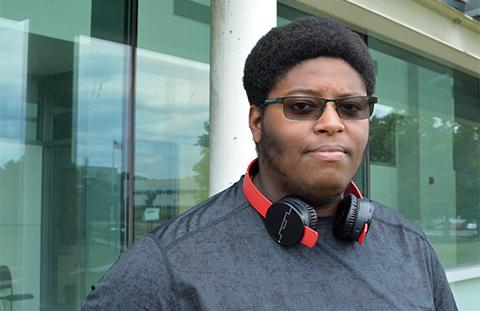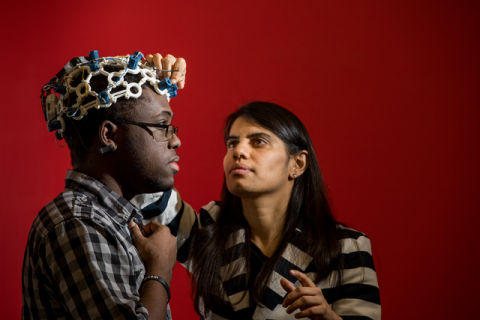Capitol student presents at IEEE conference
February 22, 2019Students involved with the Brain-Machine Interface workshop at Capitol Technology University are experimenting with technologies of the future – and they’re also gaining the opportunity to publish and present their work.
Joshua Joseph, a senior double-majoring in cybersecurity and computer science, co-authored a paper with fellow Capitol student Nicholas Keller, Dr. Garima Bajwa and Dr. Jason Pittman, the two Capitol Tech faculty members who are leading the BMI project. Following a process familiar to most scholars, they began submitting the paper to journals, and receiving rejections.
Then came some exciting news: the IEEE had selected their paper for its Ubiquitous Computing, Electronics and Mobile Communication Conference (UEMCON) at Columbia University, with publication to follow in the IEEE Xplore Digital Library.
Joshua traveled to Columbia for the event, held from November 8-10, and presented the research before an audience that included leading researchers in the field and scholars from around the globe.
“I hadn’t before experienced the process – you have an idea, conduct research, put together a paper, and work to get it published,” he said. “In this case, we were not only accepted for publication but asked to give a presentation. Not every university provides undergraduate students with the opportunity to do this.”
The paper, The Case for Secure Data Curation: A Small Brain-Machine Interface Lab Perspective, grew directly out of a problem that Joshua, Bajwa, and Pittman set out to tackle at Capitol Tech: how to properly organize and store the terabytes of data related to their work on the BMI project. The team endeavored to create a model that can potentially be used by any small university or organization facing constraints such as time, budget, and staff.
Three essential cybersecurity principles – availability, integrity, and access control – provided a framework.
“We want our data to be highly available,” Joshua explains. “If someone wants to come in and do research, it should be easy for us to give them access. At the same time, we want to make sure that the access is authorized and the integrity of the data is protected. There shouldn’t be avenues that would allow people to access the data improperly, or enable them to change or distort it.”
According to Dr. Pittman, one of the two co-authors, issues like this become paramount in the case of high-velocity, high-volume data.
“The data sets we are using in the Brain-Machine Interface lab are enormous. We’re talking terabytes of data. Philosophically our position is that the data should be shared openly. That’s easy to say, but doing it in practice you incur a host of issues – technical limitations, for instance. How do you host files that large? Dealing with the research itself, how do you control access? How do you protect identifiable information of subjects?”
Threats to the integrity of data can have very tangible consequences, he notes.
“Take a drone that could be controlled through headsets. In order to train the system so you can put on a headset and fly that drone, you need real data to feed into the machine learning so it can learn what ‘up’ means. If the data has been compromised, then your drone isn’t going to work.”
As the university deepens its engagement with cutting-edge technological research, Capitol faculty have been encouraging students to get involved. In 2017, for example, student Zalika Dixon presented at the Grace Hopper Celebration – and won third place in the ACM Student Research Competition.
By participating in research, undergraduate students can practice skills that are needed not only in academia, but in the workplace, Pittman says.
“They get project management exposure. They gain experience working on a team and working on a product, which happens to be a paper or presentation. They gain experience in public speaking. They have the opportunity to present information to a group and field questions.”




